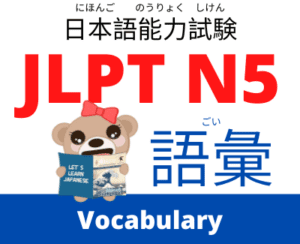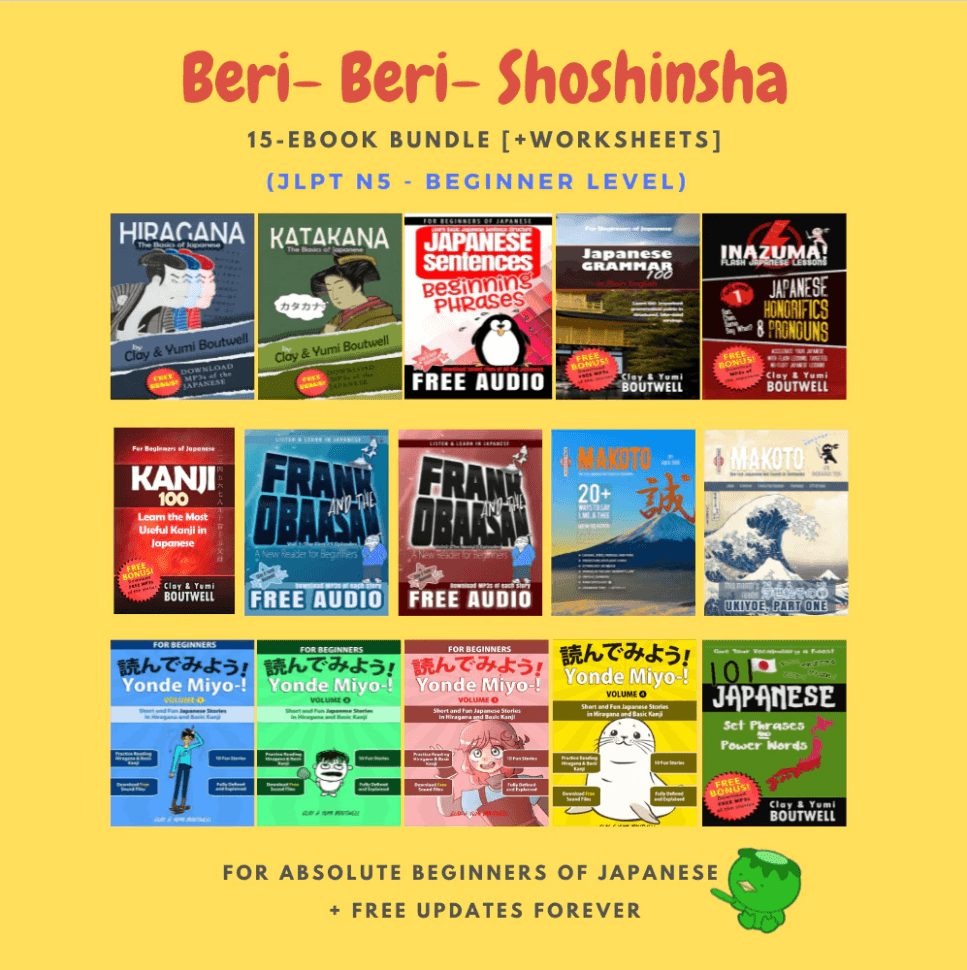
(だ)
【~だい】 a stand; counter for vehicles
車は何台ありますか? How many cars are there?
【だいがく】university
来年から大学に行きます。I will go to the university starting next year.
【たいしかん】embassy
アメリカの大使館はどこですか? Where is the American embassy?
【だいじょうぶ】OK; all right
あなたは大丈夫ですか? Are you all right?
【だいすき】 like very much
猫が大好きです。 I love cats.
【たいせつ】important
一番大切なものは愛です。 The most important thing is love.
【だいどころ】kitchen
冷蔵庫は台所にあります。The refrigerator is in the kitchen.
【たいへん】very
今日は大変暑いです。Today is very hot.
【たいへん】serious; terrible
それはたいへんですね。That is terrible.
【たかい】tall; high
うちの後ろには高い山があります。There is a tall mountain behind our house.
【たかい】expensive
このかばんは高いです。This bag is expensive.
【~だけ】only; just
もう一度だけ。Just one more time.
【たくさん】many
この道はたくさんの車が走ります。A lot of cars run on this road.
【タクシー】taxi
タクシーで行きましょう。Let’s go by taxi.
【だす】to take out; to send
ごみを出してください。 Please take out the garbage.
【~たち】plural suffix
子供たちが遊んでいます。The children are playing.
【たつ】to stand
立ってください。 Please stand.
【たて】vertical
それは、たてで見てください。Please look at that vertically.
【たてもの】building
東京は建物がいっぱいです。Tokyo has many buildings.
【たのしい】fun; enjoyable
このゲームは楽しい。This game is fun.
【たのむ】to ask; to request
先生に頼んでください。 Please ask the teacher.
【たばこ】cigarettes; tobacco
タバコは二十歳までだめですよ。Until you are twenty, smoking isn’t allowed.
【たぶん】perhaps; probably
たぶんゴジラは本当ではないでしょう。Godzilla probably isn’t real, right?
【たべもの】food
どんな食べ物が好きですか?What kind of food do you like?
【たべる】to eat
毎日ご飯を食べます。I eat rice everyday.
【たまご】eggs
卵を買ったほうがいい。It would be better to buy eggs.
【だれ】who
だれが来ましたか? Who came?
【だれか】someone
だれか、助けて!Someone, help!
【たんじょうび】birthday
今日は私の誕生日です。Today is my birthday.
【だんだん】gradually
だんだん日本語を覚えてきました。I gradually learned Japanese.
(ち)
【ちいさい】small
家は小さいけど、きれいです。The house is small, but pretty.
【ちいさな】small (before nouns)
小さな家に住んでいます。I live in a small house.
【ちがう】wrong; different
それは違います。That is wrong.
【ちかい】near
郵便局が近いです。 The post office is nearby.
【ちかく】near
この近くに郵便局があります。The post office is near here.
【ちかてつ】subway
地下鉄で行きましょう。Let’s go by the subway.
【ちず】map
地図を持っていますか? Do you have a map?
【ちち】father
父はアメリカに住んでいます。 My father lives in America.
【ちゃいろ】brown
茶色の服が好きです。I like brown clothes.
【ちゃわん】teacup; rice bowl
ちゃわんを洗ってください。Please wash the dishes.
【~ちゅう】during; in the middle of
会議中です。In the middle of a meeting.
【ちょうど】just; exactly
ちょうどいいところに来ました。You came just at the right time.
【ちょっと】a little
ちょっと待ってください。Please wait a little.
(つ)
【ついたち】the first (of the month)
次のコンサートは来月の一日です。The next concert is the first of next month.
【つかう】to use
このコンピューターを使ってください。Please use this computer.
【つかれる】to tire; become tired
ずっと勉強したら、疲れます。If I study for a long time, I get tired.
【つぎ】next
次の駅で降ります。I will get off at the next station.
【つく】to arrive; to reach
やっと東京に着きました。(We) finally arrived in Tokyo.
【つくえ】desk
私の机は汚いです。My desk is dirty.
【つくる】to make
すしを作りましょう。Let’s make sushi.
【つける】to turn on (lights)
電気をつけます。(I) will turn on the light.
【つとめる】to work; to serve
大きな会社に勤めています。I work at a large company.
【つまらない】boring; trifling
この本はつまらないです。This book is boring.
【つめたい】cold (to the touch)
氷は冷たいです。 Ice is cold.
【つよい】strong
今日は風が強いです。The wind today is strong.
(て)
【て】hand
手を見せてください。Please show me your hand.
【テープ】tape
テープがありますか?Do you have tape?
【テープレコーダー】tape recorder
古いテープレコーダーを買いました。I bought an old tape recorder.
【テーブル】table
テーブルで食べましょう。Let’s eat at the table.
【でかける】to leave; to go out
しばらく出かけます。(I) will be out for a while.
【てがみ】(postal) letter
お母さんに手紙を書きたいです。I’d like to write a letter to my mother.
【できる】can; to be able
英語ができます。I can speak English.
【でぐち】exit
出口はどこですか?Where is the exit?
【テスト】test
昨日のテストは難しかったです。The test yesterday was difficult.
【では】well then, then
では、またね。Well then, see you later.
【デパート】department store
デパートで会いましょう。Let’s meet at the department store.
【でも】but
デパートに行きたいです。でも仕事があります。I’d like to go to the department store, but I have work to do.
【でる】leave; go out
家を出ます。(I’m) leaving the house.
【テレビ】television
テレビをつけてください。Please turn on the TV.
【てんき】weather
天気が悪いですね。The weather is bad, isn’t it?
【でんき】electricity; light
電気を消してください。Please turn off the lights.
【でんしゃ】train
最後の電車に乗りました。I’m taking the last train.
【でんわ】telephone
電話を使ってもいいですか?May I use the phone?
(ど)
【と】door
戸を開けてください。Please open the door.
【~ど】degree; amount
気温は30度です。The temperature is 30 degrees.
【ドア】door
トイレのドアを開けないでください。Please do not open the bathroom door.
【トイレ】bathroom; toilet
トイレはどこですか?Where is the bathroom?
【どう】how
今日はどうですか?How about today?
【どうして】why
どうして宿題を忘れましたか?Why did you forget your homework?
【どうぞ】please
どうぞ、座ってください。Please, have a seat.
【どうぶつ】animal
どんな動物が好きですか?What kind of animal do you like?
【どうも】(intensifier)
どうもありがとうございます。Thank you very much.
【とお】ten
八つ、九つ、十 8, 9, 10 (“native” Japanese counting)
【とおい】far
ここからちょっと遠いです。(It) is pretty far from here.
【とおか】the tenth (of the month)
十日に何かしますか?Do you want to do something on the tenth?
【~とき】time
あのときのことはよく覚えています。I clearly remember what happened that time.
【ときどき】sometimes
時々、日本の映画をみます。Sometimes, I watch a Japanese movie.
【とけい】clock; watch
時計を忘れました。I forgot my watch.
【どこ】where
辞書はどこにありますか?Where is the dictionary?
【ところ】place
ここはいいところですね。This is a nice place.
【とし】year
一月一日は新しい年の初めです。January 1st is the beginning of the New Year.
【としょかん】library
図書館では静かにしてください。Please be quiet in the library.
【どちら】where; what place
お国はどちらですか?What (where) is your country?
【どっち】which
カレーかハンバーガーか、どっちにしますか?Which would you like? Curry or hamburger?
【とても】very
彼女はとてもきれいな人です。She is a very beautiful person.
【どなた】who (polite)
どなたですか?Who are you (polite)?
【となり】next to
ビルさんはとなりに住んでいます。Bill lives next door.
【どの】which
どの人が好きですか?Which person do you like?
【とぶ】to fly
スーパーマンのように飛びたいです。I want to fly like Superman.
【とまる】to stop
時計が止まりました。My watch (clock) stopped.
【ともだち】friend
友達になりました。We became friends.
【どようび】Saturday
土曜日は、家でゆっくりします。I will stay home (and take it easy) on Saturday.
【とり】bird
この鳥はどんな鳥ですか?What kind of bird is this bird?
【とりにく】chicken (food)
鶏肉を食べたいですか?Do you want to eat chicken?
【とる】to take; to grab
好きなものを取ってください。Please take what you like.
【とる】to take (a picture)
写真をよく撮ります。I often take pictures.
【どれ】which
どれがいいですか?Which is good (would you like)?
【どんな】what (kind of)
どんな食べ物が好きですか?What kind of food do you like?
(な)
【ない】none
私はスポーツには興味がない。I have no interest in sports.
【ナイフ】knife
パンを切りたいのですが、ナイフがありますか?I’d like to cut the bread. Do you have a knife?
【なか】middle; center
家の中に入りました。(He) entered the house.
【ながい】long
アマゾンは長い川です。The Amazon is a long river.
【~ながら】while
食べながら、本を読みます。(I) read a book while eating.
【なく】to cry; to sing (birds)
あの鳥はきれいに鳴きます。That bird is singing beautifully.
【なくす】to lose (something)
かぎをなくしてしまいました。I lost my keys.
【なぜ】why
なぜここに来ましたか?Why did you come here?
【なつ】summer
夏は暑いです。Summer is hot.
【なつやすみ】summer vacation
夏休みには何をしますか?What will you do for Summer Vacation?
【~など】and so forth
フルーツはりんご、バナナ、オレンジなどが好きです。As for fruits, I like apples, bananas, oranges, etc.
【ななつ】seven
五つ、六つ、七つ 5, 6, 7 (“native” Japanese counting)
【なに】what
これは何?What is this?
【なん】what (before other words)
紙は、何枚ほしい?How many pieces of paper do you want?
【なのか】the seventh (of the month)
ごみの日は七日です。Garbage pickup day is the seventh.
【なまえ】name
お名前は何ですか?What is your name?
【ならう】to learn; to study
琴を習います。I’m learning (to play) the koto.
【ならぶ】to line up
この列に並んでください。Please get in this line.
【ならべる】to arrange (things); put in order
子供がおもちゃをきれいに並べます。The children lined up their toys neatly.
【なる】to become
春になりました。It has become Spring.
【なん~】how many…
兄弟は何人ですか?How many brothers (and sisters) do you have?
(に)
【に】two
一、二、三 1, 2, 3 (“Chinese” counting)
【にぎやか】lively; cheerful
このパーティーはにぎやかです。This party is lively.
【にく】meat
今日は肉を食べたくないです。I don’t want to eat meat today.
【にし】west
太陽は西に沈みます。The sun sets in the west.
【~にち】day
一日で全部終わりました。 I finished it in one day.
【にちようび】Sunday
日曜日、海岸に行きたい。 I want to go to the beach on Sunday.
【にもつ】baggage; luggage
荷物が多い。 (I) have a lot of baggage.
【ニュース】news
最近ニュースを見てない。 (I) haven’t watched the news recently.
【にわ】garden
庭にきれいな花があります。 There is a pretty flower in the garden.
【~にん】people
何人来ますか? How many people will come?
(ぬ)
【ぬぐ】to take off (clothes)
シャツを脱ぎました。(I) took off my shirt.
【ぬるい】lukewarm (not hot enough)
ぬるま湯で手を洗ってください。Wash your hands in lukewarm water.
(ね)
【ネクタイ】necktie
毎朝、ネクタイをします。Every morning, I put on a tie.
【ねこ】cat
猫が好きです。I like cats.
【ねる】to sleep
もう遅いので、寝ましょう。It’s getting late; let’s go to bed.
【~ねん】year
今年は、2008年です。This year is 2008.





